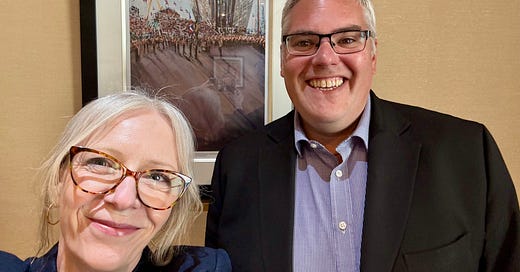You don’t need a campaign. You just need to begin.
Hi
A lot of organisations tell me they’re “not doing advocacy.”
But when I ask what they are doing, the answers sound familiar:
“We’ve raised the issue with our local MLA.”
“We mentioned it in our newsletter.”
“We’ve spoken to a journalist about it.”
Here’s what I always tell them:
That is advocacy. And it counts.
This week’s newsletter is about starting where you are, thinking strategically without overcomplicating it, and dropping the myth that advocacy only counts if it’s big, loud, or part of a national campaign.
Enjoy
Ellen
There’s a myth that’s crept into our sector.
That to do advocacy “properly,” you need a campaign plan, a catchy slogan, a media-ready logo, and a carefully timed rollout with everyone on the same page.
That unless your message is polished, branded, and endorsed by a working group, you probably shouldn’t say it yet.
Wait until the messaging’s finalised.
Wait until the funder signs off.
Wait until everyone agrees.
It’s a myth that keeps people quiet.
And it’s one of the biggest barriers I see—especially for smaller organisations, or those led by people who weren’t raised to feel entitled to speak in public spaces.
Because when the bar is set that high, people with real insight and urgency self-censor.
They wait. They second-guess. They keep working behind the scenes, while others with less experience but more confidence take the mic.
But here’s what I know to be true:
Most of the best advocacy I’ve seen didn’t come from a campaign strategy.
It came from a person, or an organisation, saying something clear and true—without permission, and without polish.
It was:
A single line in a community newsletter that sparked media coverage
A casual conversation with an MLA that turned into a Private Member’s Bill
A blunt quote in a funding application that made the panel stop and pay attention
It’s easy to believe that advocacy needs to look impressive to be impactful.
But real change usually starts with something much smaller:
A story told well.
A truth said plainly.
A problem named when others were skirting around it.
So if you’ve ever said,
“We’re not really doing advocacy yet,”
but you’re:
Raising concerns in meetings
Naming problems in your community
Sharing insights others are ignoring
Building relationships with people in power
…you are advocating.
The question isn’t whether you’re doing advocacy.
It’s whether you’re doing it on purpose.
You don’t need a campaign.
You don’t need a team.
You don’t need to wait for perfect conditions.
You just need to start speaking with clarity, consistency, and courage—from wherever you are, with whatever you have.
🧭 Hints & Tips: How to Begin Without a “Strategy”
Write down one clear ask
→ What do you want to change? Be specific. One sentence.Turn a private conversation into a public message
→ If you’ve told a politician, funder, or journalist something important—write it down. Say it publicly. Others are thinking it too.Map your allies
→ You already know someone with influence—start there. Advocacy begins with conversations, not campaigns.Use your own platforms
→ Add a simple “what needs to change” section to your next blog, report or event. No graphics needed.Stay human
→ Speak plainly. Share a story. Invite connection. Advocacy is a conversation—not a performance.
🤝 What I Can Do to Help
If your organisation wants to influence policy but isn’t sure how to start, I can help you:
Identify your clearest message and boldest ask
Map out simple, low-effort steps to start building influence
Shape content or consultation responses that actually get noticed
Engage with politicians (even if you don’t have relationships yet)
Feel more confident in saying what matters—without watering it down
📩 Just reply or drop me a note at hello@policy360.co.uk.
You don’t need a plan. Just a frustration, a vision, or a starting point.
Toolbox for the Brave
For when you're ready to do more.
🎧 Need inspiration while walking the dog? → [Listen to the podcast here]
🧠 Need strategy with backbone? → [Book a chat: hello@policy360.co.uk]
💡 P.S. The podcast earns you CPD points—because yes, listening counts as professional development.




